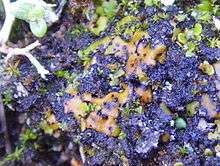Placidium
Placidium is a genus of crustose to squamulose to almost foliose lichens. The genus is in the Verrucariaceae family.[1] Most members grow on soil (are terricolous), but some grow on rock (saxicolous).[2] The fruiting bodies are perithecia, flask-like structures immersed in the lichen body (thallus) with only the top opening visible, dotting the thallus.[2]
| Placidium | |
|---|---|
 | |
| Placidium lacinulatum | |
| Scientific classification | |
| Kingdom: | |
| Division: | |
| Class: | |
| Subclass: | |
| Order: | |
| Family: | |
| Genus: | Placidium A. Massal. |
Members of the genus are commonly called stiplescale lichens or earthscale.[2]:327
Lichen spot tests are all negative.[2]
Members of the genus lack rhizines, but otherwise resemble members of the genus Claviscidium.[2]
Species
- Placidium acarosporoides
- Placidium arboretum
- Placidium lachneum
- Placidium squamulosum
gollark: Doesn't look like it.
gollark: Hmm. This is apparently a fork of Dendrite, but presumably updated even less.
gollark: The others can't do federation and are thus not really "Matrix".
gollark: A bunch of features are missing/broken, I think notably search and E2E.
gollark: I know about Dendrite. It's not "working" exactly.
References
- Lumbsch TH, Huhndorf SM. (December 2007). "Outline of Ascomycota – 2007". Myconet. Chicago, USA: The Field Museum, Department of Botany. 13: 1–58.
- Field Guide to California Lichens, Stephen Sharnoff, Yale University Press, 2014, ISBN 978-0-300-19500-2
This article is issued from Wikipedia. The text is licensed under Creative Commons - Attribution - Sharealike. Additional terms may apply for the media files.